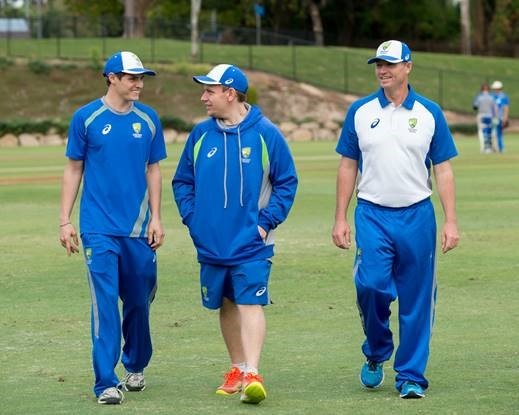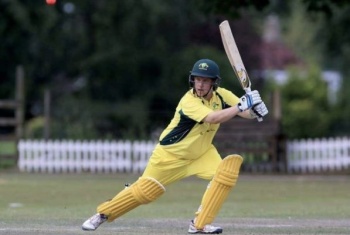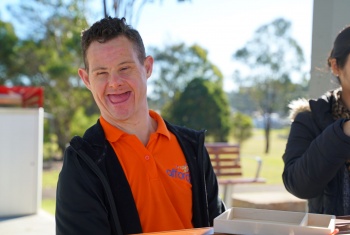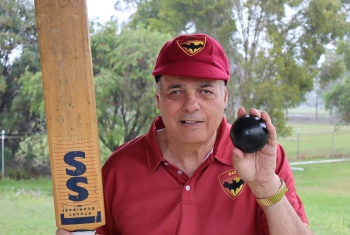It’s nice to be reminded of the joy cricket can bring. It makes David Baird’s eyes light up and his voice raise in anticipation of what the next three weeks may bring.
More than any of his teammates, David knows the mixed emotions; discovering you have been selected to represent Australia then wondering how you’ll come up with the money to make it happen.
It’s a bit like the dilemma he has found himself in now, with the England vs South Africa intellectual disability tri-series kicking off, on July 11. Australia will take on the hosts in Cheshire, and it means it will be the first time an Australian disability cricket team has been fully funded – a result of a landmark deal with long-time sponsor, Commonwealth Bank.
For David and his mum, Val, the relief is palpable. “I can’t remember how much David’s other tours cost?” Val said. “Only it was more than we could afford,” she added.
“I was on the very first tour,” David recalls (the 2005 South African trip). “I’ve watched it grow from a little thing to a big thing now!”
In 2005, David said it cost a couple of thousand dollars per player. His most recent tour to England, was closer to $5000. Without his work as assistant curator at his cricket club, Runaway Bay on the Gold Coast, not to mention his proud club’s contribution to his expenses, someone else would have the honour of being Australian ID cricketers cap No.1.
At 44, David thought his days representing Australia were truly over. His mother remembers a bleak time when surviving, rather than thriving, was achievement enough.
“David was really sick when he was little,” Val said. “He spent 13 years, more in the hospital than out, and if he had of been diagnosed today it would have resulted in cystic fibrosis.”
When Val’s first marriage ended, she was pregnant with Stephen and juggling toddler, Sheree. She was drawing a basic pension and barely making ends meet.
She married Scotsman, Duncan, who adopted her children. At length, Val would spend her days at the hospital, then take Stephen and Sheree home, make dinner, put them to bed, then go to work. “I wanted to go back to work at Woolies but they wanted more in day-care fees than I made so I took a night job,” Val said. “Back then, David’s medical expenses alone were more than $100 a week!”
The Baird’s initially lived in Canberra but moved to Ulladulla. It lacked a school that could support David, which prompted him to leave the local high school at age 14. Asked how he found his way to cricket, his caring nature came to the fore, “I played rugby league, but I ran over some kid and broke his collarbone. I felt guilty so I stopped playing,” he said.
In David’s early cricket games, he batted at No.11. He made lots of ducks and it took him five years to post a 50. Now he is enormously proud of having made 2500 runs for Runaway Bay, opening the batting mainly in the fourth grade but as high as the seconds. His lung issues demand a consciousness of his physical limits, which can be lost in the heat of battle. “I can run two and three, (although) sometimes I get knocked up running a three. One year I ran a five and I was run out by a couple of inches. I was buggered,” he said.
For a 71-year-old, Val’s maternal instincts are still as strong as ever. “He had a turn at the supermarket about a year ago,” she said. “They took him in and his blood sugar was 51. He shouldn’t have been alive!” Recently, his glucose level had to be brought down from 28. Val will sweat on daily text messages she has told David to send her from England, letting her know all is well.
David is thankful to have had great mentors and many willing helping hands along the way. Runaway Bay’s ground is named after Sam Loxton, who played in Don Bradman’s legendary “Invincibles”, which toured England in 1948. “He’d come down and help out when he was still alive,” David said. “He always remembered me, and I learnt a little bit off him every time!” he added.
Back in their Ulladulla days, David was picked to captain the NSW ID team. Steve Waugh came down to training, and a shy soul asked David if he would get Waugh to sign a bat. When Waugh asked David if it was his, he replied, “No, I’ve got my bat on lay-by.” He went home that day with the Australian captain’s Gunn & Moore bat and gloves, signed with a personal message of encouragement.
The lasting impression runs much deeper than the material, imparting in David a desire to do for others what good people have done for him. Others like Nick McConnell, the youngest member of the Australian ID team, who David mentors at Runaway Bay. “I’ve got my level one coaching, and Nick’s my protégé,” David said with obvious pride. “He bowls – left arm, swings it both ways. He’s only 20, and he’s really excited.”
Nick cites Mitchell Johnson as someone he would love to bowl like, and he knows how lucky he is to have David by his side. “He’s got a lot of knowledge about the game,” Nick said. Apart from playing the drums, playing poker, cooking and working back of house at a pizza shop, Nick can now add “play cricket for Australia” to his list. He said he likes the sound of that. “I want to make my name and play for Australia for a long time,” he said.
Same as Haydn Brumm, another Queenslander. He is happy he made a recent switch from indoor cricket to outdoor, just as David did in 2005, when the national team didn’t fall under the Cricket Australia umbrella, rather it was picked from the best indoor practitioners. This is Haydn’s first tour too, and he admits if it wasn’t funded he would probably have stuck to the indoor game. “Now it’s all funded, I’ll hopefully keep going with outdoor,” he said.
Three years ago, Haydn took up umpiring indoor cricket. He has progressed to national championships level and now he works and plays at his local centre in the Brisbane suburb of Turnbull. He reckons the speed of indoor cricket has made him a more dangerous fielder, while umpiring means he is always in the game. “You never know when your time’s up. And I get paid!” he said happily.
Haydn has a simple approach to batting, which won’t change on his national team debut. “I pretty much like to have a swing, if it’s there to hit it!” he said.
Haydn and Nick are true success stories from the National Cricket Inclusion Championships, held in Geelong, back in January, where three categories catered for the intellectually disabled, blind and vision impaired, and deaf and hearing impaired. They have progressed via a pathway David never had, but one he is rapt will be producing many more Australian cricketers for generations to come.
David feels privileged to be part of that growth. During those long hospital stints, his mother would bring in an old black and white television and sit it at the end of his bed so he could watch the cricket. She recalls arriving at his room many times to find a group of nurses crowded around the TV with David giving them a lesson in how the game is played.
As for David’s future plans, “I want to get more into coaching, helping kids with disability,” he said. Last week, at the Gabba, he was part of a Queensland Cricket day, where half a dozen Brisbane schools specific to supporting children with disability attended. His advice to them was simple. “Play cricket for fun. It’s a team sport, not an individual sport, and it’s great for friendships as well,” he said.
Cricket is also great for building memories. On the first South African tour, David faced the very first ball bowled to an Australian ID team cricketer, tucked it off his pads for two, and allowed himself to smile at how great it was to be playing for his country. Until they were fielding, he dived to stop a ball and broke his collarbone on the rock-hard outfield. “I was scorer’s helper for the rest of the tour,” he added.
In England, in 2007, David met Shane Warne, at Hampshire, then went out and made 42. He was primed for a big innings at serene Arundel, perched above the River Arun, in the shadows of the 1000-year-old castle but his batting partner ran him out. He laughs at the memory, and returns to cricket’s birthplace, emboldened he already knows the conditions and likes the slower wickets. Besides, he’s still an Australian cricketer and this time it’s not costing him or Val a cent.
Sadly, Val’s husband Duncan had a stroke in 2009. David helped her nurse him at home for 18 months before he passed away.
“Dave’s a great person,” Val said. “I’m just so proud of him. He represents all the kids I know with disability. People look at them as being stupid, but they’re not!”



